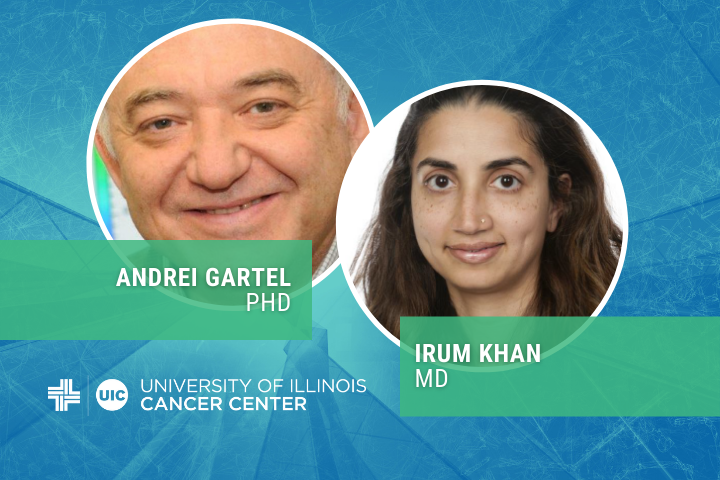
University of Illinois Cancer Center member Andrei Gartel has received a two-year grant from the National Center for Advancing Translational Science to study how reducing the amount of the protein FOXM1 by FOXM1 inhibitors in the nucleus of AML-M5 leukemic cells can improve the prognosis for patients with acute myeloid leukemia (AML).
In AML, stem cells that would normally differentiate into blood cells instead multiply unchecked and fail to develop into mature blood cells. AML patients have a high risk of death from uncontrolled infection, fatigue easily and sustain organ damage because they lack adequate numbers of oxygen-carrying red blood cells. They are also at high risk for dangerous bleeding due to low numbers of cells that help with blood clotting.
“FOXM1 is involved in all hallmarks of cancer, and targeting this transcription factor may lead to the inhibition of cancer development,” said Gartel, PhD, associate professor of molecular genetics and a member of the Cancer Center’s Cancer Biology program. “Pharmacological inhibition of FOXM1 is a promising approach to treating AML but it has proven to be challenging.”
Gartel and his colleagues (Cancer Center member Dr. Irum Khan, a member of the Translational Oncology program and assistant professor of medicine, serves as co-principal investigator) have identified two novel compounds – STL427944 and benzamil hydrocholoride – that suppresses FOXM1 in AML-M5 (a rare cancer characterized by a dominance of monocytes in the bone marrow) and potentially could be used as specific FOXM1 inhibitors in the disease.
FOXM1 activates other cancer-promoting genes and is elevated in cancer cells. The presence of FOXM1, especially at high levels, is a strong predictor of worse treatment outcomes and decreased survival in patients with cancer. Gartel and his colleagues observed that when gene encoding nucleophosmin (or NPM, a protein that can transport other molecules from the nucleus) is mutated, FOXM1 is re-localized to cytoplasm together with NPM where it can’t activate transcription of its targets, which lends better results to chemotherapy.
Over the past 30 years, 20% to 40% of patients suffering from AML fail to achieve remission with induction chemotherapy, with 50% to 70% of patients achieving complete remission relapse within three years, Gartel said. Discovering the NPM1 mutation in 40% to 60% of cytogenetically normal (CN)-AML cases was a major breakthrough, he said. In subsequent analyses it has been shown that AML patients with wild-type FMS-like receptor tyrosine kinase (FLT3), bearing mutated nucleophosmin (NPM1mut), show improved overall and relapse-free survival. Gartel proposed that inactivation of FOXM1 in cytoplasm of AML cells with mutant NPM1 is partially responsible for favorable outcome for patients.
“A drug that targets and incapacitates FOXM1 in nuclei of the patients with wild-type of NPM1 (without the beneficial NPM1 mutation) may help improve the efficacy of chemotherapy,” Gartel said.
In July 2021, Gartel’s laboratory published two relevant papers on the work. The first, “Novel FOXM1 inhibitor identified via gene network analysis induces autophagic FOXM1 degradation to overcome chemoresistance of human cancer cells” was published in Cell Death & Disease. The paper described the mechanism of FOXM1 repression by STL427944 compound in cancer cells.
The second paper, “FOXM1-AKT Positive Regulation Loop Provides Venetoclax Resistance in AML” was published in Frontiers in Oncology. It explained novel AKT-FOXM1 positive mutual regulation in AML is responsible for resistance to venetoclax.
The Cancer Center awarded Gartel and Khan a $50,000 research grant last year as part of its pilot grants program to study FOXM1 in AML. The purpose of the grant program is to stimulate new interprogrammatic research initiatives that will lead to competitive grant applications submitted to external peer reviewed funding organizations.
